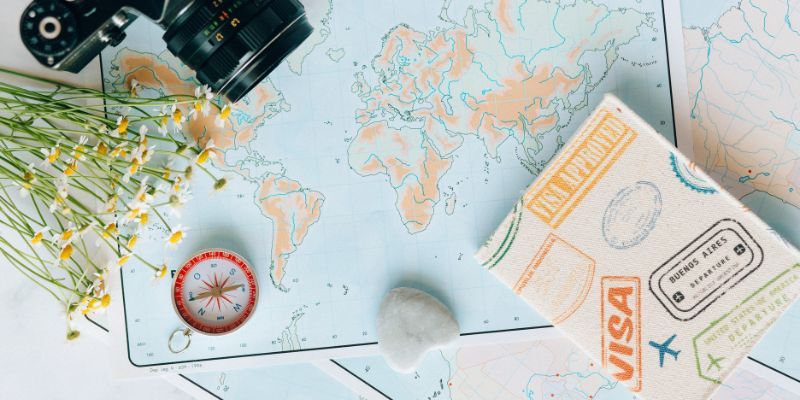Even if this is your first vacation to the Holy Land, organizing your travel to Israel will be a breeze. Everything you need to know about visiting Israel is included in this guide.
Israel is the promised land. Middle Eastern culture, sunlight, partying, and delicious food combine in one ideal setting. And now it's time for your first trip there. This little country at the crossroads of Asia, Europe, and Africa has a considerable past and was once considered the geographical center of the globe.
Israel offers everything: icy waterfalls, enormous deserts, ancient ruins, and cutting-edge contemporary art. You might wonder, "Where do I even begin?" in a nation with many options. In preparation for your first trip to Israel, the land of milk and honey, we have compiled this helpful travel guide.
Travel Restrictions And Entry Requirements:
Israel has loosened its stance on Covid-19 significantly. To enter Israel, visitors must fill out an Israel Entry Form in advance, but they are no longer forced to take a Covid-19 test, produce immunization certificates, or wear face masks on airplanes.
If visitors to Israel become ill during the first 10 days of their stay, the government requests that they undergo a polymerase chain reaction (PCR) test. The treatment of Covid-19 requires visitors to have health insurance.
Depending on the prevalence of Covid, the government may reinstate mask requirements for indoor public venues. Masks may still be necessary in some workplaces.

Which Is The Best Time To Visit Israel?
Between April and May, during the spring, is the ideal time to visit Israel. Currently, we're looking at a temperature of about 26 °C. September and October, the onset of fall, are also pleasant times to visit Israel. Highs of 32 degrees Celsius have been recorded throughout the summer (June–August).
If you love the beach, though, now is the time to visit Israel. You may walk outside and bask in the sun. The Dead Sea and Tel Aviv are particularly pleasant this time of year. During the winter, average temperatures dip to roughly 10 degrees Celsius.
What To Do In Israel?
Religious sites, food, antique markets, mosaics stitched together millennia ago, camel rides in the desert, and fresh fish and salads at chic urban eateries can all be seen in a weeklong whistle-stop tour of Israel. Or maybe just one or two of these, taken at a pace more fitting to the local mellowness. The beaches on Israel's Mediterranean coast are a popular destination for vacationers looking to unwind.
Within only two hours drive of one another, nature enthusiasts may see three very different types of landscape: arid desert, serene lakes, and verdant mountains. Explore natural areas like the oasis of Ein Gedi, or slather on some Dead Sea mud and relax in the saline water. Art museums, a wealth of old architecture (take heed, Bauhaus fans), and historical walking tours provide a wealth of options for culture vultures.
Where To Stay In Isreal?
The two largest towns in Israel, Tel Aviv and Jerusalem, each include various hotels, from 5-star establishments to quaint inns and hostels. Many tourists spend their whole trip staying in either of these two central locations and then day-tripping to nearby attractions because of how convenient it is to do so using public transportation.
Vacationers interested in experiencing rural Israeli life can do so by staying at a kibbutz hotel. The early 20th century saw the rise of kibbutzim, or communal villages that were once agricultural powerhouses but are now more likely to have replaced chicken coops with office space.
However, kibbutzim provide a unique perspective on Israeli society, and several are located close to protected areas in the Golan Heights.

Don't Forget To Pack And Dress Modestly:
Jerusalem and other holy cities, as well as orthodox districts, require visitors to dress modestly. Even though it may be hot during the summer, it is suggested that visitors to holy sites and the place where Jesus was crucified wear long skirts or slacks and t-shirts with sleeves that fall below the elbow.
The locals are conservative, so you shouldn't risk upsetting them. It is the kind of essential advice you'd like to hear before visiting Israel. Worry not if you neglect to pack warm clothes; pious ladies distribute them at the Western Wall.
Is Israel Expensive?
Most sources that compare the cost of living say that Israel is less expensive than the UK. Hotels and sightseeing excursions might put a damper on your budget. Comparatively, a basic room at the Hilton will set you back about 400 GBP, whereas comparable accommodation in Dubai will set you back about 100 GBP.
Is The Food That Good?
Israel's cuisine is both varied and delicious. Falafel, consisting of fried chickpea (garbanzo bean) balls, is widespread. The names of many more delicious Middle Eastern and Arabic foods escape me, but I know they are authentic. Food that doesn't follow Jewish dietary laws (such as pork and shellfish) isn't considered kosher.
Eat anything in Israel! You might not like it, but at least it's the worst that can happen. There is also more conventional Western fare for those who want it. Many hotels and restaurants provide alcoholic beverages. However, they tend to be somewhat pricey.
Conclusion:
So, perhaps you've gotten enough ideas for your vacation and valuable information about Israel to get you there. Visiting this country would be a fantastic experience. Please be informed that in honor of the Jewish Sabbath, all businesses and modes of public transportation will be closed beginning Friday afternoon and continuing until Sunday morning.
While many eateries will be open and other transportation options will be available, weekends tend to be quieter overall and in Jerusalem. Most Israelis can communicate in English, albeit doing so will be much simpler in the country's major urban centers.

Sean William Jan 04, 2023
Top 6 Things To Know Before Visiting Atlantic City

Sean William Aug 28, 2023
Most Amazing Pyramids In Mexico

Juliana Daniel Dec 25, 2022
Detailed Plan For A Single-Day Trip To Arches National Park

Juliana Daniel Aug 27, 2023
Get To Know About 8 Top Tourist Attractions in Rome 2023

Juliana Daniel Dec 25, 2022
Most Popular Barcelona Attractions

Sean William Aug 28, 2023
Fascinating Cave Dwellings In The World

Juliana Daniel Aug 27, 2023
Kenya Travel Guide

Sean William Dec 26, 2022